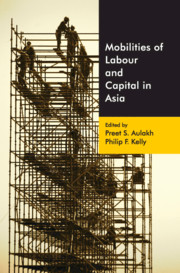Book contents
- Frontmatter
- Contents
- List of Figures
- List of Tables
- List of Appendices
- Acknowledgements
- 1 Introduction: Conceptualizing Labour and Capital Mobilities In and Out of Asia
- SECTION I From Capital to Labour Mobility
- 2 Offshore Spaces: Multi-scalar Bordering Processes and the Segmented Mobilities of Capital and Labour in Asia
- 3 Japanese Multinational Companies and the Control of Overseas Investments: Expatriates, Foreign Employees, and Japan's Soft Power
- 4 Accumulation at the Margins? Mineral Brokerage and Chinese Investments in Philippine Mining
- 5 Soft Power and Transnationalism Affecting Capital and Labour Mobility: Chinese Diaspora in Mexico and Peru
- 6 The Spatial Decoupling and Recombination of Capital and Labour: Understanding the New Flows across the China–South East Asia Borderlands
- SECTION II From Labour to Capital Mobility
- Notes on Contributors
- Index
3 - Japanese Multinational Companies and the Control of Overseas Investments: Expatriates, Foreign Employees, and Japan's Soft Power
from SECTION I - From Capital to Labour Mobility
Published online by Cambridge University Press: 24 December 2019
- Frontmatter
- Contents
- List of Figures
- List of Tables
- List of Appendices
- Acknowledgements
- 1 Introduction: Conceptualizing Labour and Capital Mobilities In and Out of Asia
- SECTION I From Capital to Labour Mobility
- 2 Offshore Spaces: Multi-scalar Bordering Processes and the Segmented Mobilities of Capital and Labour in Asia
- 3 Japanese Multinational Companies and the Control of Overseas Investments: Expatriates, Foreign Employees, and Japan's Soft Power
- 4 Accumulation at the Margins? Mineral Brokerage and Chinese Investments in Philippine Mining
- 5 Soft Power and Transnationalism Affecting Capital and Labour Mobility: Chinese Diaspora in Mexico and Peru
- 6 The Spatial Decoupling and Recombination of Capital and Labour: Understanding the New Flows across the China–South East Asia Borderlands
- SECTION II From Labour to Capital Mobility
- Notes on Contributors
- Index
Summary
Introduction
On 3 February 2018, over 500 university students assembled for a career fair in Singapore's Expo Centre. Singapore sees numerous career events every year, but what made this ‘ASEAN Career Fair with Japan’ 2018 stand out was that participating companies were nearly all Japanese and that most of these companies were looking to hire employees into their home operations in Japan. Job seekers came from further afield than just Singapore. The majority of students had travelled from other South East Asian countries, with the fair organizers subsidizing travel for many of the participants. The career event was being held for the sixth time and was competing with several other such events that have come to be regularly organized in Singapore and other countries in Asia to support Japanese companies seeking to recruit foreign personnel into their home operations. What explains this drive by Japanese companies to hire foreign university graduates for employment in Japan, and how can we approach this phenomenon theoretically?
In 1988, Saskia Sassen pointed to a link between investment and human mobility streams, arguing that ‘these patterns in the new immigration become particularly acute when we consider that the major immigrant-sending countries are among the leading recipients of the jobs lost in the U.S. and of U.S. direct foreign investment in labour-intensive manufacturing and service activities’ (1988: 13). Sassen pointed to Asia as the newly emerging primary source of migrants to the USA and to the existence of a combination of push and pull factors underlying this trend. Moreover, she pointed to the fact that investments, the internationalization of production, and other forms of engagement have created ‘linkages that contributed, directly or indirectly, to emigration’ (1988: 16). In a similar vein, Massey et al. (1993) have pointed to the importance of economic, cultural, and ideological links in determining the direction and nature of migration flows. The ability of developed core countries to channel migration streams towards themselves might well be linked to former colonial relationships that shape affinities in terms of language, education, and administrative systems. Moreover, the consequences of economic penetration are reinforced by the activities of media and advertising companies as well as the establishment of communication and transportation infrastructures.
- Type
- Chapter
- Information
- Mobilities of Labour and Capital in Asia , pp. 48 - 71Publisher: Cambridge University PressPrint publication year: 2020



